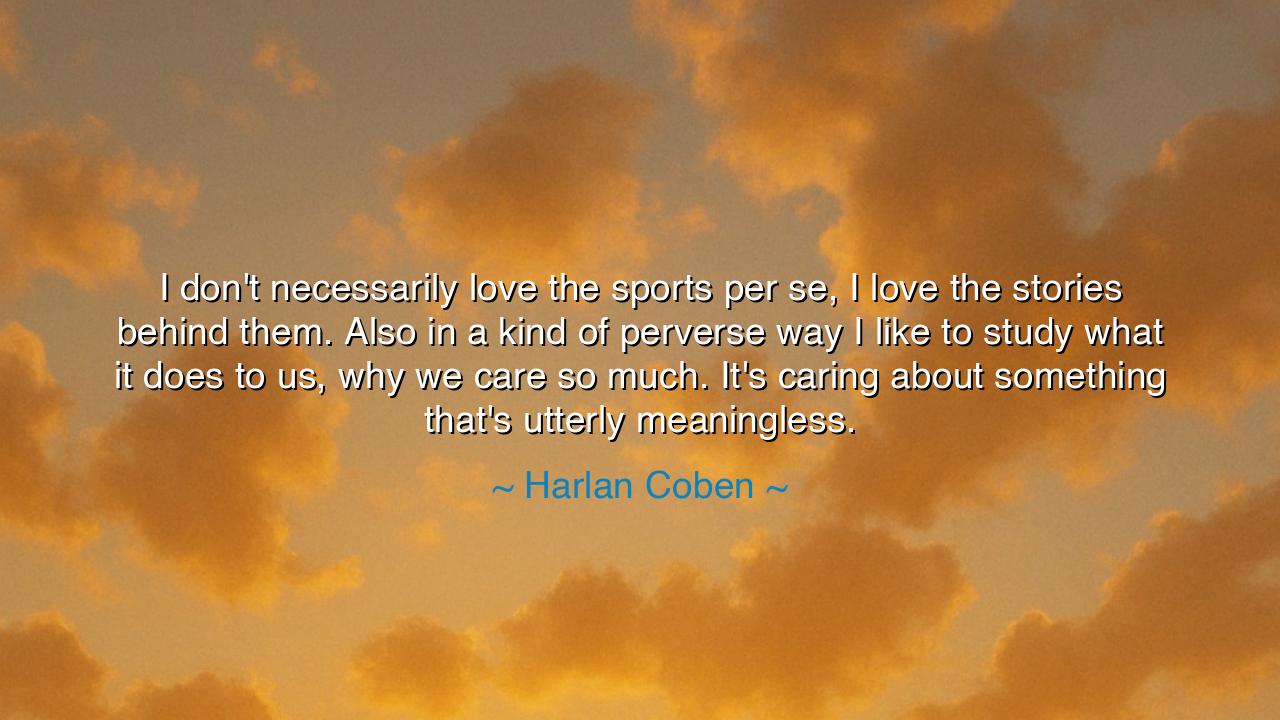
I don't necessarily love the sports per se, I love the stories
I don't necessarily love the sports per se, I love the stories behind them. Also in a kind of perverse way I like to study what it does to us, why we care so much. It's caring about something that's utterly meaningless.






"I don't necessarily love the sports per se, I love the stories behind them. Also in a kind of perverse way I like to study what it does to us, why we care so much. It's caring about something that's utterly meaningless." These words from Harlan Coben strike at the heart of a deep philosophical inquiry about the human condition. What is it about sports that ignites such fierce passion, such devotion, when at its core, it is a mere contest of strength, skill, and luck? Coben's reflection is not on the games themselves, but on the stories they tell—stories of triumph, failure, identity, and meaning. It is not the physical exertion of athletes that fascinates him, but the deeper psychological and emotional forces that shape how we, as humans, relate to these games. Why, indeed, do we care so much about something that, in the grand scheme of life, may seem utterly insignificant?
In the ancient world, this question was echoed in the great epics and myths of Homer and Virgil, who immortalized the struggles and triumphs of heroes. Consider Achilles, the greatest of the Greek warriors in the Iliad. His rage, his pride, and his quest for honor were the very substance of his character, and yet, his greatest victories were set against a backdrop of war—something fleeting, temporary, and often meaningless in the grand arc of human history. His story, however, transcended the battlefield. It became a reflection of the human desire for meaning, for recognition, and for legacy. Just as Achilles’ glory on the field of battle was a story that captivated all of Greece, so too are sports stories a reflection of our deeper needs to find purpose and identity in a world full of fleeting achievements.
The ancient Romans too were captivated by sports—the gladiatorial games, for example, though brutal and life-threatening, were more than just violent spectacle. They were a reflection of the Roman spirit—a celebration of strength, courage, and endurance. Yet, as much as the gladiators were praised for their bravery, their lives were ultimately meaningless in the eyes of the ruling class. They fought for the entertainment of the masses, yet their stories were steeped in the larger questions of power, mortality, and legacy. In this sense, the gladiatorial games, much like modern sports, are a study of the human need for meaning through spectacle, for finding purpose in trivial pursuits that nonetheless resonate with deep emotions.
One of the greatest examples of this can be found in the life of Marcus Aurelius, the philosopher-emperor of Rome. He was a man of wisdom, known for his Stoic philosophy, yet he participated in the very spectacle of gladiatorial games that he would have known were, in the larger sense, meaningless. Yet, like Coben, Aurelius understood that there was something deeply human about these rituals—they spoke to the human need to prove oneself, to demonstrate courage in the face of death, and to leave a legacy. In watching the games, the people of Rome felt a connection to something greater than themselves. The stories behind the games—the lives and sacrifices of the gladiators—were more meaningful than the games themselves, for they encapsulated the struggles and triumphs of the human spirit.
Coben’s reflection also invites us to consider the nature of storytelling itself. Why are we so drawn to these narratives of victory and defeat? It is because they tap into something fundamental about the human experience: our need for connection and meaning. Sports stories, like those of ancient heroes and legends, provide us with a lens through which we can examine our own lives—our fears, our desires, and our need for recognition. Just as we were moved by the battles of Achilles and Hector, we are moved by the underdog victories in sports, the last-minute goals, the comebacks that speak to our deep-seated belief that anything is possible.
The lesson in Coben's words is clear: meaning is often not found in the act itself, but in the story we tell about it. The hero’s journey, whether it takes place on a battlefield, in a sporting arena, or in the quiet moments of our lives, is what imbues our actions with purpose. Sports may seem, in the grand scheme of things, like a trivial pursuit, but the emotions they stir—the joy, the grief, the pride, the humiliation—are real, and they reveal to us the depths of the human spirit. In the grandeur of victory and the pain of defeat, we find connection, we find identity, and we find meaning.
In practical terms, we can apply this lesson to our own lives. Often, we are caught in the pursuit of goals that may seem trivial in the grand scheme of existence—career success, personal achievements, recognition—but it is not the outcome that defines us; it is the story we tell about our journey. Just as sports can provide a narrative that allows us to reflect on our own strength and resilience, so too must we learn to see the stories of our own lives as avenues for growth, connection, and purpose. We must learn to value the journey, the struggles, and the narratives we create, knowing that, like in sports, it is not the final score that matters most, but the meaning we imbue in every moment along the way.






AAdministratorAdministrator
Welcome, honored guests. Please leave a comment, we will respond soon